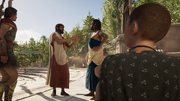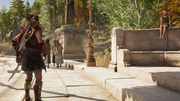mNo edit summary |
mNo edit summary |
||
| (One intermediate revision by one other user not shown) | |||
| Line 15: | Line 15: | ||
|voice = |
|voice = |
||
}} |
}} |
||
| − | '''Plato''' ( |
+ | '''Plato''' (c. 427 BCE or c. 424 BCE – c. 347 BCE), born '''Aristokles''', was an ancient [[Greece|Greek]] philosopher, widely considered the most pivotal figure in the development of philosophy, especially the Western tradition. He was a student of [[Sokrates]] and the teacher of [[Aristotle]]. |
==Biography== |
==Biography== |
||
| − | + | Aristokles was only a young boy in the early years of the [[Peloponnesian War]]. At one point, he made the acquaintance of the [[Sparta]]n ''[[Mercenary|misthios]]'' [[Kassandra]]. After she gathered supporters to help Sokrates out of jail, he introduced himself to her but also shared that he did not like the name. Kassandra suggested he choose a new one, and he settled on 'Plato', a name by which his {{Wiki|Antiphon brother of Plato|brother}} used to call him. He also told Kassandra of his passion for debate and how he hoped to be student of Sokrates one day.<ref name="Persuasion">''[[Assassin's Creed: Odyssey]]'' – [[Persuasion Check]]</ref> |
|
| − | Plato eventually went on to become an influential author and philosopher. |
+ | Plato eventually went on to become an influential author and philosopher. Around 388 BCE, he founded a school of philosophy that later came to known as the {{Wiki|Platonic Academy}}. The school attracted numerous mathematicians and geometers such as [[Archytas]], a [[Pythagoras|Pythagorean]] philosopher, and [[Eudoxos of Knidos]], an astronomer. He was later eventually succeeded by his nephew [[Speusippos]].<ref name="DT">''[[Discovery Tour: Ancient Greece]]'' – [[Discovery Tour: Ancient Greece#School of Greece - Philosophy|School of Greece – Philosophy: "Importance of Philosophy"]]</ref> |
In his work ''{{Wiki|Republic (Plato)|The Republic}}'', Plato made his famous {{Wiki|Allegory of the Cave}}, in which prisoners were chained inside a cave and forced to look at a cave wall. They were not able to see the world outside, but only the reflections on the wall that the outside world made. The prisoners are able to free themselves when they see that the intangible, represented by the reflections, is real.<ref>''[[Assassin's Creed: Origins]]'' – [[The Empirical Truth]]</ref> |
In his work ''{{Wiki|Republic (Plato)|The Republic}}'', Plato made his famous {{Wiki|Allegory of the Cave}}, in which prisoners were chained inside a cave and forced to look at a cave wall. They were not able to see the world outside, but only the reflections on the wall that the outside world made. The prisoners are able to free themselves when they see that the intangible, represented by the reflections, is real.<ref>''[[Assassin's Creed: Origins]]'' – [[The Empirical Truth]]</ref> |
||
| Line 35: | Line 35: | ||
ACOD Persuasion Check 6.png|Plato speaking to Kassandra |
ACOD Persuasion Check 6.png|Plato speaking to Kassandra |
||
ACOD Young Plato Closeup.png|Closeup of a young Plato |
ACOD Young Plato Closeup.png|Closeup of a young Plato |
||
| + | DTAG Plato Teaching in the Grove at Academia - Joshua Cristall.jpg|Plato teaching in the gardens of the Academy, painting by {{Wiki|Joshua Cristall}} |
||
</gallery> |
</gallery> |
||
Revision as of 15:27, 9 July 2020
Plato (c. 427 BCE or c. 424 BCE – c. 347 BCE), born Aristokles, was an ancient Greek philosopher, widely considered the most pivotal figure in the development of philosophy, especially the Western tradition. He was a student of Sokrates and the teacher of Aristotle.
Biography
Aristokles was only a young boy in the early years of the Peloponnesian War. At one point, he made the acquaintance of the Spartan misthios Kassandra. After she gathered supporters to help Sokrates out of jail, he introduced himself to her but also shared that he did not like the name. Kassandra suggested he choose a new one, and he settled on 'Plato', a name by which his brother used to call him. He also told Kassandra of his passion for debate and how he hoped to be student of Sokrates one day.[1]
Plato eventually went on to become an influential author and philosopher. Around 388 BCE, he founded a school of philosophy that later came to known as the Platonic Academy. The school attracted numerous mathematicians and geometers such as Archytas, a Pythagorean philosopher, and Eudoxos of Knidos, an astronomer. He was later eventually succeeded by his nephew Speusippos.[2]
In his work The Republic, Plato made his famous Allegory of the Cave, in which prisoners were chained inside a cave and forced to look at a cave wall. They were not able to see the world outside, but only the reflections on the wall that the outside world made. The prisoners are able to free themselves when they see that the intangible, represented by the reflections, is real.[3]
Legacy
In 1497, during the Bonfire of the Vanities, one of Girolamo Savonarola's nine lieutenants stated that Savonarola condemned the teachings of both Plato and Aristotle, remarking that the only good thing they owed them was bringing forward many arguments which they could use against the heretics and that they and other philosophers were in Hell.[4]
In 1868, Evie Frye quoted Plato while talking to her brother Jacob although Jacob mistakenly believed that she was quoting their father, Ethan Frye.[5]
Gallery
Appearances
- Assassin's Creed II (mentioned only)
- Assassin's Creed: Syndicate (mentioned only)
- Assassin's Creed: Origins (mentioned only)
- Assassin's Creed: Odyssey (first appearance)
References





